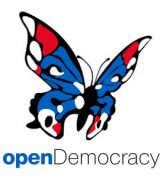
openDemocracy
openDemocracy offers in-depth news analysis and commentary from a pro-Democracy, pro-Human Rights perspective.
openDemocracy is committed to human rights and democracy. We aim to ensure that marginalised views and voices are heard. We believe facilitating argument and understanding across geographical boundaries is vital to preventing injustice.
Beyond and behind the headlines
We won’t tell you what to think. We offer you a spectrum of ideas, from the people who have lived through the events, from those on the ground making a difference, from scholars with expert knowledge. In-depth, independent, inside.
Our writers provide you with the background information you need to challenge the politics of any place. Every day, we publish new articles and opinions.
50.50 – Towards democratic debate
A global debate without the female half of humanity is neither global nor democratic. With this in mind, openDemocracy‘s 50.50 initiative is building a series of editorial projects designed to make openDemocracy a current affairs forum which is written, read and used equally by women and men.
Website: www.opendemocracy.net
Facebook: www.facebook.com/openDemocracy
Twitter: https://twitter.com/opendemocracy
YouTube

Associate's Articles
It may well be that the Euro-Summit agreement of 12 July 2015 is forced through in a process at least as brutal, and even more divisive, than the extremities of the eurocrisis seen over the last five years. But even this does not necessarily preclude the renewal of European politics.
Europe as a republic
The story of Europe in the twenty-first century
The system currently known as the European Union is the embodiment of post-democracy, says Ulrike Guérot. The solution: to turn Europe on its head. For the Europe of tomorrow is a European Republic, the embodiment of a transnational community.
The European Union is willing to use costly police and military operations to suppress refugee mobility, write Mariagiulia Giuffré and Cathryn Costello. Which, in short, means responding to those fleeing war, repression and human rights abuses with more of the same. So what are the alternatives?
Humanitarian rhetoric, inhumane treatment
The European Union's approach to migrants
In an article first published prior to the 19 April capsizing of a wooden fishing boat and consequent drowning of around 800 migrants in the Mediterranean, Judith Sunderland and Bill Frelick warn about the EU’s preference for border enforcement over the creation of safe, legal channels into the EU.
Greece doesn’t just need debt relief, it deserves it. Of this much Thomas Fazi is convinced. After all, most of the bail out money has gone to banks and creditors, which irrefutably puts to shame the claim that European taxpayers’ money was used to save Greece and the other reckless countries of the periphery.
Preventing violence against women
International solidarities
Nothing short of dramatic social transformation can eliminate the legal, economic and political basis for cults of gender difference and male privilege; and thus end the violence. So says Anne Marie Goetz, arguing that international solidarities are of crucial importance to the struggle.
Call of duty, or call for change?
On masculine violence
Endemic male violence against women, and the militarization of the dominant form of masculinity in our culture: surely these things are not unrelated, writes London-based feminist Cynthia Cockburn. A plea for a culture of equality, co-operation and peace.
Without a façade to hide behind: Lessons from Bulgaria
Lessons from Bulgaria
The longest anti-government protest in Bulgarian history brought about the resignation of Plamen Oresharski’s cabinet in July. But where does the political process go from here? Nikolay Nikolov remains optimistic about the outcome of the country’s tormented transition to democracy.
Afghan Jungle, Hazara Jungle and Palestine House. Such are the names of squats and camps in Calais that have existed in various incarnations for years: the result of two European nations fortifying themselves against crises of their own making, writes Timothy Cooper. History continues to repeat itself.
The habits of the heart: Substantive democracy after the European elections
Substantive democracy after the European elections
Only a mixture of bottom-up and top-down measures can avoid a nationalist cycle of disintegration now, argues Mary Kaldor. This means opening up the public sphere, especially at local and transnational levels, at the same time as creating a framework for a civilizing globalization.
The EU’s response to the NSA scandal, a recent landmark European Court of Justice ruling and the European Parliament’s rejection of ACTA: all developments, argue Amandine Scherrer and Jef Huysmans, that show the EU remains key to achieving an Internet commons.
Corporatization is transforming what activists and NGOs conceive of as being realistic and possible in terms of desirable change. Genevieve LeBaron and Peter Dauvergne examine recent trends that raise crucial issues about the future of global citizen action.
The perils of procedural democracy: A lesson from Bosnia
A lesson from Bosnia
At the beginning of February, violent protests swept through Bosnia-Herzegovina: demonstrators clashed with police and government buildings were set ablaze. But then, independent citizens’ assemblies began to be organized to formulate demands to be made to the government.
Increased securitization and discrimination against migrants has neither reinforced the freedom, security and well-being of EU citizens nor curbed irregular migration, writes Eve Geddie. It’s time to change the European discourse on undocumented migrants.
Plenty of women are working as correspondents and reporters, but relatively few as opinion writers and editors. And while the gender gap in print is insidious, in broadcast media it’s glaringly obvious, writes Dawn Foster. Meanwhile, the gentrification of the media continues apace.
The prospect of Romania’s parliament passing new legislation, allowing the expropriation of citizens’ homes to make way for Europe’s largest gold mine, has prompted some of the country’s most significant protests since the fall of communism. Claudia Ciobanu reports.